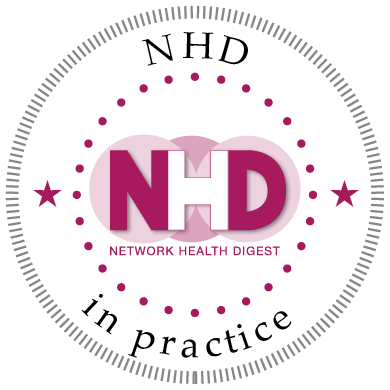NHD STUDENT BLOG SERIES

Digital dietitians – from analogue to digital
By NHD blogger, Sian Cunningham, RD
Technological advances continue to move quickly, with no sign of slowing down. Digital literacy is becoming more and more important, and by 2039 all NHS staff will be required to have a certain knowledge of digital tech.
The internet was widely available by 1991 and the first smartphone was launched in 2007. Those born from 1980 onwards (millennials, Gen Z and Gen Alpha) are considered born into the digital era and don’t know a world without technology. For those born a wee bit earlier, they will have known a world before smartphones and the internet and will have seen the development of these technologies.
With first-hand experience of how new technologies have revolutionised the way we communicate and changed our ways of working, we have had to learn to adapt to these new technologies over time. You will notice a difference in people's love of, willingness or ability to use technology, regardless of the generation they were born in.
It’s helpful to understand different perspectives and why digital confidence might vary from person to person. For example, although the proportion of people regularly using the internet has been increasing, a considerable number of older people are not internet users or use it rarely.)
Among people aged 75 and over in the UK, around 1 in 3 do not use or rarely use the internet, compared with around 1 in 10 (750,000) of 65- to 74-year-olds.(1) The charity Mencap also highlights the impact of digital exclusion on people with a learning disability, which can be due to accessibility and affordability.(2

Requirement to be digitally competent

The Health and Care Professions Council (HCPC) standards of proficiency were updated in 2023 to include a requirement to 'utilise technology and digital methods to enhance the care that you provide'.(3) This means that all UK-registered Allied Health Professionals (AHPs) must engage and use digital tools in order to maintain standards of proficiency in healthcare.
By 2039, 90% of all jobs in the NHS will require some element of digital skills, meaning that all staff will have to have a certain level of digital literacy.(4)
At present, most, but not all, dietetic departments are using electronic patient records to record their patient contacts, having made the switch from paper notes. The Topol Review (2019) found that health technology will support the workforce to tackle the challenges of the 21st century, giving them more time with their patients.
The BDA's digital vision
The BDA Digital Vision, launched in April 2025, (5) has been created to support the nutrition and dietetic profession in embracing new and innovative ways of working and ensuring good practice when working digitally. The vision has been designed to be used by the whole of the dietetic workforce, irrespective of the environment, geographical location, career level, or speciality.
It aims to:
provide an understanding of the current use of digital technologies and practices within the nutrition and dietetic workforce;
provide a digital vision for the dietetic workforce until 2029;
empower the dietetic workforce to use digital tools and technologies efficiently and confidently.
The BDA Digital Vision supports providing equitable delivery of care, improving health inequalities, optimising service delivery and improving the service user experience. As healthcare continues to change and the demand increases, with potentially reduced resources to do the job, using digital tools can help to meet these demands and potentially in a more sustainable way, reducing travel and lowering the carbon footprint.
Finding out more...
Whilst digital tools offer lots of benefits, they can never wholly replace the skills and qualities of the nutrition and dietetic professional. Technology cannot replace our communication skills, empathy, ethics, creativity and emotional intelligence. We also have the insight and knowledge to consider which technology is most appropriate for particular circumstances.
As healthcare professionals, we need to use technology ethically and effectively to do our jobs, whilst bearing in mind how its usage can be both beneficial and detrimental to our health, well-being and the patients we care for.
Digital technology can provide more efficient ways of working, freeing up some time (yay!) so that we can use that free time to doom scroll Instagram (boo!).
You can find out more by visiting the BDA digital webpages here..


Siân works with the BDA as Professional Practice Manager. She previously worked as an Assistant Professor at the University of Nottingham. She has worked in a range of clinical areas, specialising in learning disabilities, palliative care and nutritional support. Twitter@: siancunningham2
Siân Cunningham, MSc, RD, AFHEA
Professional Practice Manager, BDA
References:
Age UK (2024) Facts and figures about digital inclusion and older people internet-use-statistics-june-2024. https://www.ageuk.org.uk/siteassets/documents/reports-and-publications/reports-and-briefings/active-communities/internet-use-statistics-june-2024.pdfpdf
Mencap—written evidence (DCL0027) House of Lords Communications and Digital Select Committee inquiry ‘Digital exclusion and cost of living’ committees.parliament.uk/writtenev https://committees.parliament.uk/writtenevidence/119014/pdf/idence/119014/pdf/
Health and Care Professionals Council (2023) Revision to the standards of proficiency. https://www.hcpc-uk.org/standards
Health education England (2019) The Topol Review. https://topol.hee.nhs.uk/
BDA Digital Vision https://www.bda.uk.com/static/332bfec5-d442-4a92-96da8f99cddc1c08/BDA-Digital-VisionFINAL.pdfonFINAL.pdf
